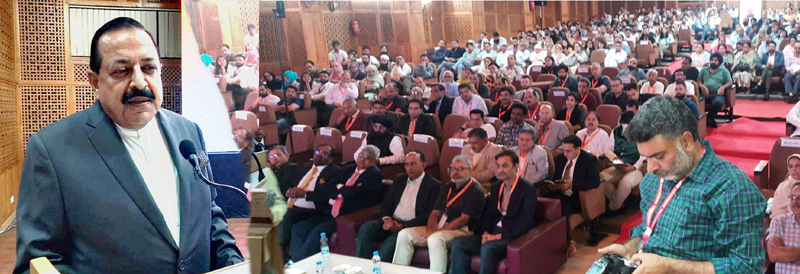
Excelsior Correspondent
SRINAGAR, Sept 23: Union Minister of State (Independent Charge) for Science and Technology, MoS PMO, Department of Atomic Energy and Department of Space and MoS Personnel, Public Grievances and Pensions, Dr. Jitendra Singh today said, India is a role model for the world having offered integrated approach in preventive healthcare and credited Prime Minister Narendra Modi for making India a world leader in ‘Preventive Healthcare’ by enabling Indian scientists to develop first ever DNA Vaccine for Covid and provide it to the other countries.
The Minister also emphasised the importance of preventing Type 2 Diabetes Mellitus and other lifestyle disorders in the young through this integrated approach.
Dr. Jitendra Singh was addressing ICMR-India Diabetes and Joint Diabetes program at Kashmir University & the valedictory function of ‘Genomics towards Better Health’ Event.
During his address, Dr. Jitendra Singh said, Biotech Start-ups are crucial to India’s future economy as Biotechnology as awakened by PM Modi has its own merits and potential to lead India. “India’s bio-economy was just about $8 Billion in 2014 and now under Prime Minister Narendra Modi we have at least awakened to the merits of Biotechnology and Bioeconomy which has grown up to $100 Billion, now we are targeting $150 Billion by 2025”. Dr. Jitendra Singh added.
Dr. Jitendra Singh, commended the organizers for orchestrating a well-designed and highly scientific program that delved into topics of current importance, laying the groundwork for breakthroughs in the field of genomics. He emphasized that genomics is no longer confined to the realm of research but has a profound impact on precision and personalized medicine. India, he noted, is making significant strides in comprehending the role of genetics across various domains, particularly in healthcare.
Highlighting the pivotal role played by the “GenomIndia” project, one of the flagship initiatives of the Department of Biotechnology (DBT), Dr. Jitendra Singh appreciated the efforts of Dr. Ashraf Ganie leading the project, which is poised to improve our understanding and research further in the field.
Addressing the gathering Dr. Jitendra Singh said that both the institutions, CSIR and Kashmir University jointly collaborating for a project here today, have a rich legacy and have marched with the times along with the journey of independent India.
Dr. Singh talked about the National Education Policy 2020 which will ensure that the coming generation will get the best of the aptitude and talent particularly in the area of research and innovation. Earlier the education system was not flexible and did not give us enough opportunity but now the whole ecosystem is now more favourable and the credit of this bold initiative goes to Prime Minister Narendra Modi.
While speaking about the success of Startup policy, Dr Singh said that the total number of startups have sprung up from 35400 to 125000 just in 8 to 9 years because of the new favourable startup policy. In space alone, in 4 years we have gone up from 4 start ups to 150 startups. This shows how the new startup policy offered a lot of opportunities encouraging more startups to come forward. The more integrated and wholesome we become, the more we will excel.
The government has come up with The Anusandhan National Research Foundation of which the Kashmir university and other institutions can make best use of it.
Dr. Jitendra Singh closed his address by underlining the pressing need for more such innovative programs and institutions for non-communicable diseases, particularly diabetes. He stressed the necessity of dedicated diabetes institutions for research and training, ultimately contributing to better healthcare and well-being for all.

